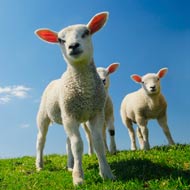
A team of researchers from 26 institutions in eight different countries has completed the first sequencing of the entire sheep genome.
The collaboration was led by the Commonwealth Scientific and Industrial Research Organisation (CSIRO) and included scientists from China, the United States and the UK (University of Edinburgh’s Roslin Institute).
By comparing sheep’s genes with those of humans, cattle, goats and pigs, scientists were able to:
• Pinpoint genetic differences that make sheep different from other animals
• Show that sheep have been a separate species from goats for 4 million years
• Identify the genes that give sheep their fleece
• Uncover the features of their digestive system that make them so well suited to a diet of low quality grass
Sheep are an important biomedical model, as well as a major source of meat, milk and wool products, and this accomplishment could lead to improvements in the rural economy as well as further biomedical research into a number of conditions in humans such as sepsis and asthma.
CSIRO project leader Dr Brian Dalrymple, said: “Given the importance of wool production, we focused on which genes were likely to be involved in producing wool. We identified a new pathway for the metabolism of lipid in sheep skin, which may play a role in both the development of wool and in the efficient production of wool grease (lanolin).”
Head of genetics and genomics at The Roslin Institute, Professor Alan Archibald, said: “Sheep were one of the first animals to be domesticated for farming and are still an important part of the global agricultural economy. Understanding more about their genetic make-up will help us to breed healthier and more productive flocks.”
The study has been published in the journal Science.



 The Veterinary Medicines Directorate (VMD) is inviting applications from veterinary students to attend a one-week extramural studies (EMS) placement in July 2026.
The Veterinary Medicines Directorate (VMD) is inviting applications from veterinary students to attend a one-week extramural studies (EMS) placement in July 2026.